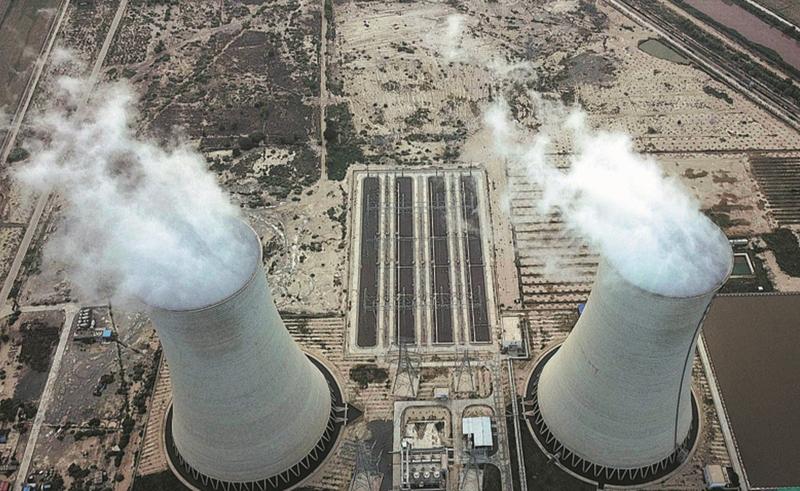 Two cooling towers are seen in the Sahiwal Thermal Power Plant in the Pakistani city of Sahiwal in August. The coalfired plant, which generated 9 billion kWh of electricity in 2018, is among a number of energy projects along the ChinaPakistan Economic Corridor. (PHOTO / XINHUA)
Two cooling towers are seen in the Sahiwal Thermal Power Plant in the Pakistani city of Sahiwal in August. The coalfired plant, which generated 9 billion kWh of electricity in 2018, is among a number of energy projects along the ChinaPakistan Economic Corridor. (PHOTO / XINHUA)
For business manager Fazal Rahim, operations at the Port Qasim Power Plant he helps oversee in southern Pakistan haven't skipped a beat even as all precautions have been taken against the coronavirus.
Pakistani authorities said last week that work on the Western Route of the CPEC was in full swing. A four-lane expressway from Hakla, near the capital Islamabad, to Dera Ismail Khan in the Khyber Pakhtunkhwa Province is due to be completed next year
"Rest assured, COVID-19 has not even slowed down the pace of work here," he said. "Credit goes to the management and the workers, both Pakistanis and Chinese."
Of the 1,060 employees at the plant in Karachi, 292 are Chinese.
"Stable operations continue at Port Qasim Power Plant. Not a single worker has contracted the virus so far," said Xi Peng, deputy chief representative of Power Construction Cooperation of China in Pakistan.
"We have made sure every worker complies with standard operation procedures to keep the virus at bay.
"All employees are following the necessary precautionary measures such as wearing masks in public places, washing hands on a frequent basis and avoiding gatherings."
ALSO READ: Virus: WHO urges Pakistan to reimpose intermittent lockdowns
As an independent power producer, the coal-fired power plant is just one of a number of energy projects emerging in the China-Pakistan Economic Corridor, or CPEC. It has been jointly developed by Powerchina Resources Limited (China) and Al Mirqab Capital Qatar (Qatar). It is projected to meet the electricity demands of 4 million households when completed.
"Since operations started in April 2018, we have steadily increased the ratio of Pakistani employees, especially from technical operations, to pool the talents of Pakistan's young generation," Xi said. Apart from posts in engineering management, locals are working as skilled workers and logistics service providers.
Rahim, for one, is glad to work there. "The Chinese are the best workers in the world. Their dedication and commitment to work has almost transformed the dream of the CPEC into a reality."
One such Chinese worker is Hu Ling, manager of the corporate culture department at the plant, who chose to stay during Chinese New Year in January. "One needs to serve the company with devotion and enthusiasm," Hu said over the phone. "We have to accomplish the CPEC.
"I always keep in touch with my family by video call. Although the epidemic is relatively severe, I firmly believe that with wise decision-making, the whole society's unity and strong support of the people from all walks of life, we can surely overcome the epidemic."
Mohammad Saad, a senior Pakistani official, said: "The CPEC is a priority. We have made sure that the COVID-19 pandemic doesn't affect progress on projects under the CPEC."
On the way to completion
Various other projects under the CPEC are on the way to completion.
Pakistani authorities said last week that work on the Western Route of the CPEC was in full swing. A four-lane expressway from Hakla, near the capital Islamabad, to Dera Ismail Khan in the Khyber Pakhtunkhwa Province is due to be completed next year.
It will cut travel time from 5 hours to 2-and-a-half hours, according to Asim Saleem Bajwa, a retired lieutenant-general who is the special assistant to the prime minister on information and broadcasting.
Experts believe the 292-kilometer Western Route of the CPEC will help usher in an era of economic prosperity in some of the country's most underdeveloped regions.
Work on the Suki Kinari-KP Hydel Power Project, with a capacity of 874 megawatts, is steadily progressing. Bajwa said recently that 50 percent of the work had been completed.
READ MORE: As Pakistan glacier melt surges, efforts to cut flood risk drag
In the city of Multan, a roadway known as PKM-undertaken by the China State Construction Engineering Corporation, or CSCEC-is the largest transportation infrastructure project to come on line in the CPEC. Since opening to traffic on Nov 5, it has become the country's most advanced motorway.
"Our company highly values the health and safety of every employee," the Pakistan Observer newspaper quoted the Pakistani logistics supervisor-whose family name was given as Muzzamil-as saying at the main camp of the CSCEC PKM project.
After the coronavirus broke out in Pakistan, company officials carried out epidemic-prevention measures, while implementing a "fully closed management" and bringing in thorough disinfection processes. Details such as body temperature of workers have been logged daily.
All personnel followed the epidemic prevention requirements, and so "no case of infection has occurred in our camp", Muzzamil added.
The writer is a freelance journalist for China Daily.


